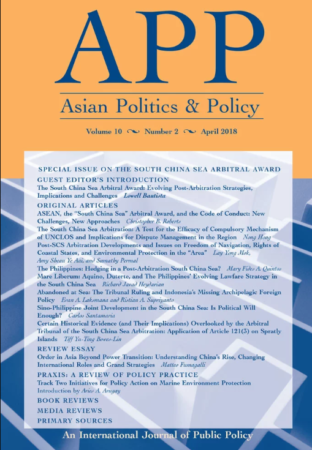Home / Books & Journal Articles / Journal Article / The South China Sea Arbitration: A Test for the Efficacy of Compulsory Mechanism of UNCLOS


Executive Director & Senior Fellow
Dr. Hong is the author of a newly released journal article in Asian Politics and Policy, The South China Sea Arbitration: A Test for the Efficacy of Compulsory Mechanism of UNCLOS and Implications for Dispute Management in the Region.
To cite this article:
Hong, N. (2018), The South China Sea Arbitration: A Test for the Efficacy of Compulsory Mechanism of UNCLOS and Implications for Dispute Management in the Region. Asian Politics & Policy, 10: 219-246. doi:10.1111/aspp.12395

Executive Director & Senior Fellow
Dr. Nong Hong holds a PhD of interdisciplinary study of international law and international relations from the University of Alberta, Canada and held a Postdoctoral Fellowship in the University’s China Institute. She was ITLOS-Nippon Fellow for International Dispute Settlement (2008-2009), and Visiting Fellow at Australian National Centre for Ocean Resources and Security (2019), the Center of Oceans Law and Policy, University of Virginia (2009) and at the Max Planck Institute for Comparative Public Law and International Law (2007). She is concurrently a research fellow with China Institute, University of Alberta, Canada, and the National Institute for South China Sea Studies, China. Her research takes an interdisciplinary approach to examining international relations and international law, with focus on International Relations and Comparative Politics in general; ocean governance in East Asia and the Arctic; law of the sea; international security, particularly non-traditional security; and international dispute settlement and conflict resolution.

The Institute for China-America Studies is an independent nonprofit, nonpartisan research organization dedicated to strengthening the understanding of U.S.-China relations through expert analysis and practical policy solutions.
1919 M St. NW Suite 310,
Washington, DC 20036
icas@chinaus-icas.org
(202) 968-0595
© 2024 INSTITUTE FOR CHINA-AMERICA STUDIES. ALL RIGHTS RESERVED.
Some Observations on the U.S. Announced Extended Continental Shelf Outer Limits